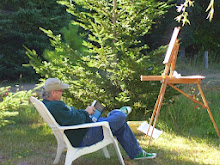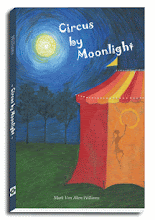As someone once said, “I really want a poem to spout roses and spit bullets.” I agree. It’s no wonder that one of my favorite songs from a while ago was Send Lawyers, Guns and Money by Warren Zevon.
Now I'm hiding in Honduras
I'm a desperate man
Send lawyers, guns and money
The shit has hit the fan
So what constitutes a good poem? For me, it is something that says more in a few words than a novel can in five hundred pages, with wit and word-play. It has an extraordinary mixing of music and image, word and thought. The job of the poet is to choose the right words, not only for sound (the music of poignant language) and connotation (landscape), but even for the countenance of them.
The poem corresponds to a centrifuge of sound, alliteration and rhythm. The reader will be walking into a world for the very first time; a world of terseness and parsimony.
Poetry IS about words!
Another person also said, “What makes a good poem? A good poet.”
So I have two great poets for you to discover this summer: Zbigniew Herbert and Miroslav Holub. They are two of my favorite poets.
Zbigniew Herbert is an avant-garde poet from Poland, who experiments with precise, restrained rhythms. His poetry is continually exposed to the impersonal, external pressures of politics and history. He started writing poetry during the Nazi occupation of Poland, and during the years of Stalinism his poems were continually banned. A. Alvarez says “Irony", such as Herbert’s, “is a two-edged weapon, which turns on the poet as readily as on the world outside. It is based on a sense of his own ineffectual fragility when faced with the steam-roller of political force." His politics is of sanity and survival; something that is completely relevant for this new century.
Also a survivor of WWII, Miroslav Holub was conscripted as a railway worker under the Nazi occupation of Czechoslovakia. He went on to become one of his country’s most important scientists, as a research immunologist at The Institute for Clinical and Experimental Medicine. He argued that, “The emotional, aesthetic and existential value is the same (that scientific method and poetry-making are basically similar)…When looking into the microscope and seeing the expected and when looking at the nascent organism of the poem.” He felt an affinity for the aesthetic of his fellow doctor-poet William Carlos Williams, who is also one of my favorite American poets (along with Wallace Stevens).
So here’s Holub spitting a few bullets at you-
Here too are dreaming landscapes,
Lunar, derelict.
Here too are the masses,
Tillers of the soil.
And cells, fighters
Who lay down their lives
For a song.
Here too are cemeteries,
Fame and snow.
And I hear murmuring,
The revolt of immense estates.
Does anybody have any poets that they would like recommend to me?
Showing posts with label Summer Reading. Show all posts
Showing posts with label Summer Reading. Show all posts
Friday, June 13, 2008
Thursday, June 12, 2008
Summer Reading
Have you considered your summer reading roster yet? I have just been exploring how other people pick their list and the parameters of their decisions. Most suggestions include:
1. Books you own, but have not read.
2. Read a classic that you should have read in High School, but never did.
3. Include a History book.
4. Read a Biography.
5. Don’t forget a book of Poetry.
6. Don’t think for yourself and read what your favorite magazines choose.
What I found interesting is that none of the suggestions I found, suggest picking an author to focus on or even discover.
If this produces an “ah-yes” moment for you, I have an author for you.
The most refreshing work that I have come across recently is from Roberto Bolaño, the Chilean poet and author of twelve novels. He has received some of the Hispanic world’s highest literary awards. Born in Chile, he lived much of his life as a nomad, living in Mexico, El Salvador, France and Spain. He was at the front, as a founder, of an Avant-garde group of poets and writers in Mexico who called their work infarealism. Living in Spain, he died in 2003, at the age of fifty, of liver failure while waiting for a transplant. Years of hard-living finally paid their toll.
To make it simple, I would suggest starting with Los detectives salvajes (The Savage Detectives- now in English translation), winner of the 1999 Romulo Gallegos Prize (Venezuelan). The novel centers on the poetic movement of visceral realism, which can be seen as an echo of Bolaño’s own infarealism. It is a road-book that is anything but linear.
Locations, characters and plot-threads expand to reflect a sense of displacement. Not unlike Bolaño’s own life, the characters travel in search of roots. This may cause some work on your part, because of the non-linear story. But remember, “Easy” is for magazines and such. Good literature should challenge you. Look for the tones, for it is there where you find more than just a story. Find yourself enmeshed in figuring out how Bolaño artfully weaves together his patchwork of poets.
As he points out, “All poets, even the most avant-garde, need a father. But these poets were meant to be orphans.” It is no wonder that the establishment figure of Octavio Paz is so brutally assailed. Let the person, inside of you, who loves to rebuff authority get some catharsis this summer.
Even if you have become the establishment- take a little time to explore the inner orphan in you.
1. Books you own, but have not read.
2. Read a classic that you should have read in High School, but never did.
3. Include a History book.
4. Read a Biography.
5. Don’t forget a book of Poetry.
6. Don’t think for yourself and read what your favorite magazines choose.
What I found interesting is that none of the suggestions I found, suggest picking an author to focus on or even discover.
If this produces an “ah-yes” moment for you, I have an author for you.
The most refreshing work that I have come across recently is from Roberto Bolaño, the Chilean poet and author of twelve novels. He has received some of the Hispanic world’s highest literary awards. Born in Chile, he lived much of his life as a nomad, living in Mexico, El Salvador, France and Spain. He was at the front, as a founder, of an Avant-garde group of poets and writers in Mexico who called their work infarealism. Living in Spain, he died in 2003, at the age of fifty, of liver failure while waiting for a transplant. Years of hard-living finally paid their toll.
To make it simple, I would suggest starting with Los detectives salvajes (The Savage Detectives- now in English translation), winner of the 1999 Romulo Gallegos Prize (Venezuelan). The novel centers on the poetic movement of visceral realism, which can be seen as an echo of Bolaño’s own infarealism. It is a road-book that is anything but linear.
Locations, characters and plot-threads expand to reflect a sense of displacement. Not unlike Bolaño’s own life, the characters travel in search of roots. This may cause some work on your part, because of the non-linear story. But remember, “Easy” is for magazines and such. Good literature should challenge you. Look for the tones, for it is there where you find more than just a story. Find yourself enmeshed in figuring out how Bolaño artfully weaves together his patchwork of poets.
As he points out, “All poets, even the most avant-garde, need a father. But these poets were meant to be orphans.” It is no wonder that the establishment figure of Octavio Paz is so brutally assailed. Let the person, inside of you, who loves to rebuff authority get some catharsis this summer.
Even if you have become the establishment- take a little time to explore the inner orphan in you.
Subscribe to:
Posts (Atom)






